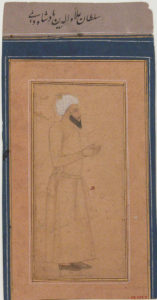The name ‘Alauddin Khilji’ became quite famous during the past year. This is primarily due to the controversial Indian epic ‘Padmaavat’ based on the story of a Rajput queen, Rani Padmaavati. In this film, the primary antagonist is Alauddin Khilji who is the primary focus of this article. He was known as one of the most powerful and ruthless rulers of India. So here’s everything you need to know about the life of this formidable Sultan.

Interesting Facts about Alauddin Khilji
1. He lost his parents when he was young and was raised by his uncle.
He was born as Ali Gurshasp and lost his parents at a young age. He was born in the Birbhum district of West Bengal. He was the nephew/son-in-law of the First Sultan of the Khilji dynasty, Jalaluddin, who raised Alauddin and his 3 brothers.
2. He married his cousin, the daughter of Jalaluddin.
Alauddin was married to Malika-I-Jahan, but the marriage was one without any happiness. Malika was known to be quite arrogant in her demeanour. Alauddin decided to make another woman, Mahru, his second wife. This only led to further tension with Malika. He went on to marry 4 times.
3. He was appointed as a Governor.
As a reward for helping to contain a revolt by a Governor, Jalaluddin decided to award Alauddin the post of the new Governor. His new position put him in touch with the very people who would convince Alauddin to usurp the throne. Alauddin was known for his thirst for power and he had a dream of becoming the second Sikander (the Persian rendition of the name of Alexander the Great).
4. He killed his uncle in order to take over the throne.
Prior to the assassination, Alauddin was instigated by outside political forces to dethrone his uncle from the Sultanate. Alauddin was ultimately convinced that Jalaluddin was an ineffective and frail ruler. He declared himself the new king with the title ‘Alauddunya wad Din Muhammad Shah-us Sultan’ of Kara.
5. The administrative changes he made had a positive impact on the kingdom.
Despite the claims regarding Alauddin’s barbaric nature, he succeeded in establishing strategic agricultural and military reforms for the kingdom. This particularly helped the peasant and farmer communities, who were the base of the kingdom’s agrarian economy. He reformed the tax system as well, effectively removing the Zamindars (landowners of the farmers) from this and allowing the farmers to be freer. In addition to this, he chose to ban gambling, alcohol and drug consumption. This is a controversial fact about Alauddin Khilji, but he was deemed to have a positive influence in this way.
6. The Khilji Dynasty expanded under Alauddin’s rule.
Alauddin was considered the most successful ruler of the Khilji Dynasty in its 30-year reign. Of these thirty years, Alauddin would rule for 2 decades from 1296 to 1316 from his seat in the Delhi Sultanate. Under his regime and at the peak of his power, Alauddin’s forces controlled major parts from Afghanistan to Bihar as well as from Kashmir to Karnataka.
7. Alauddin helped to defend India against the Mongol empire.
The Khilji dynasty was not just known for their fierceness and faithlessness; they were crucial for defending India against the Mongol invasions. This was particularly under Alauddin’s rule. The complex nature of the invasions was due to the fact that the Mongols were separated into different tribes and attacked the empire at multiple places. However, Alauddin was successful in using his military expertise and brutality to prevent this and managed to keep India’s people and culture safe from foreign forces.
8. History documents him as a tyrant.
Anyone who suspected Alauddin or spoke ill of him would be sentenced to death along with the women and children of that individual’s family. He would even brutally execute members of his own family in suspicion of a rebellion they were planning. He further slaughtered around 20,000 people who had recently converted into Islam, due to fears of an uprising.
9. He became very distrustful during his last years.
Alauddin suffered from illness towards his final years, which caused him to grow increasingly suspicious of his officers. He went onto abolishing several offices of his court and executed their officers. It was thought that his slave general, Malik Kafur, coerced Alauddin to carry out this purge. Alauddin died in 1316. Several claims say he was thought to have been murdered by Kafur but there is insufficient evidence to prove this.
I hope that you enjoyed this article, Alauddin Khilji Facts. For other interesting facts about other people in history, visit historical people facts.
